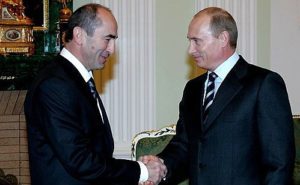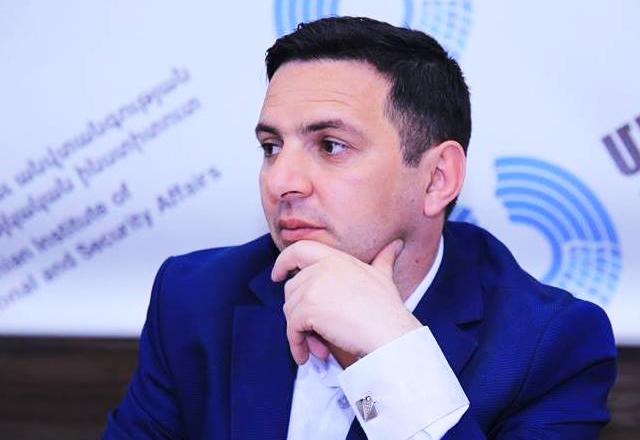On July 27, an Armenian court ordered the detention of former Armenian President Robert Kocharian for two months. The Armenian ex-president is charged with overthrowing the constitutional order during events after the 2008 elections. If convicted, he will face a long prison sentence. It would be the first case in which a head of state is detained in one of the former Soviet Republics.
It was expected that the United States, the European Union, and especially Russia would respond to Kocharian’s detention case. However, only the U.S. Department of State has touched upon Kocharian’s detention. In response to a question posed by the Voice of America, a U.S. State Department official said, “The United States has consistently called on the Armenian authorities to conduct a serious, credible and independent investigation into the March 1, 2008 events. We continue stressing to our Armenian partners that it is important to respect the internationally recognized standards for conducting justice.”
And thus far, it has also been fairly quiet on Russia’s end. Only pro-Kremlin experts Stanislav Tarasov and Modest Kolerov made statements on the issue, both of which expressed that Kocharian’s detention is Armenia’s internal issue and that Russia does not intend to interfere in Armenia’s internal affairs.
But Russia’s silence on Kocharian’s arrest is surprising. Of all Armenia’s presidents, he is considered by far the most Russian-oriented. And the Kremlin is usually not indifferent to the persecution of its allies. With that in mind, should we expect Russia to take a stand or intervene? And what would they stand to gain by doing so?

As mentioned earlier, until now, former presidents of post-soviet countries have typically avoided persecution for their wrongdoings, a fact which makes the case with Kocharian unprecedented in the region. Former heads of state have in the past fled to Russia (where they were granted asylum), and only then, in their absentia, is sentencing made by the local courts. Some examples of this can be found with the ex-president of Azerbaijan, Ayaz Mutalibov, the ex-president of Kyrgyzstan Askar Akayev, and the former Ukrainian President Viktor Yanukovych, who at different points in time, fled to Russia in order to avoid justice.
Robert Kocharian led an obvious pro-Russian policy and increased Armenia’s dependence on Russia during his tenure. Previous to taking office, as the ex-President mentioned, Russian investments in the Armenian economy were limited. However, during Kocharian’s first years in office, Russia became the number one investor in Armenia. Kocharian achieved this by handing over to Russia a number of strategic assets of Armenia. Particularly, in 2003 Armenia signed the “Property for Debt” program with Russia, according to which, some energy and other strategic assets of Armenia were transferred to Russia in exchange for writing off its $100 million debt. This deal has been strongly criticized by Armenian opposition leaders, however, Robert Kocharian considers it a very successful and profitable deal for the country.
… during Kocharian’s first years in office, Russia became the number one investor in Armenia.
The policy of transferring objects of strategic importance to Russia continued throughout his presidency. In 2005, when a new Iran-Armenia gas pipeline was being built, a number of Russian officials expressed their concern about the serious threat it could pose to Russian strategic interests, since through the gas pipeline, Iran could export gas to Europe via Armenia. This was of deep concern to Russia, given its monopoly in the EU gas market. As a result of pressure from Russia, the pipeline’s diameter on the Armenian border was reduced to 715 millimeters, while in the Iranian section it was 1.5 meters. After that, during Robert Kocharian’s (and later, Serzh Sargsyan’s) rule the Russian Gazprom company purchased a majority share in the Armenian section of the pipeline and became the sole owner of it, which eliminated the opportunity to export Iranian gas to Europe and the chances of Armenia to get significant income from the transit of gas.
The story of the Hrazdan Thermal Power Plant’s fifth energy block is also remarkable. In 2005, the governments of Armenia and Iran came to an agreement, according to which the Iranian side would invest the entire $150 million for the completion of the fifth energy block of the plant. No investment was required from the Armenian side. Instead, Armenia would ship electricity generated at the Hrazdan plant to Iran in return for Iranian gas. After 10 years, profit from the fifth block would be returned to Armenia. The deal was to be signed when the Armenian government unexpectedly sold the Hrazdan Thermal Power Plant’s fifth energy block to Russian Gazprom.
In addition to the energy facilities, Kocharian transferred other assets of strategic importance to Russia, namely, Armenia’s military industrial facilities. Even before his retirement, on February 13, 2008, he handed over the concession management of the Armenian railway to Russia for 30 years. And it should be noted, in the years since, Russia has not made any serious investments in this field. Many are convinced that the real objective of taking over the concession management of the Armenian railways was to make it, too, dependent on Russia.
After his retirement, the ex-president of Armenia became a shareholder of one of the largest Russian companies, Sistema, and a member of its board of directors. Sistema is a large company that operates in different sectors of the economy, including telecommunications, high technology, banking, real estate, healthcare services and hospitality. Many people believe that Kocharian’s involvement in the board of directors of this largest company was purely by accident. But closer inspection reveals that in recent years, Russia has pursued a policy whereby the ex-leaders of countries with close relationships to Russia end up on on the board of directors of the largest Russian companies.
The most vivid example of this is the former German Chancellor Gerhard Schroeder, who is currently a member of one of Russia’s energy giants, Rosneft Oil Company, and is lobbying for Russia’s interests in Germany. It is also noteworthy that one of the current politicians in Armenia, the leader of the ‘‘Rule of Law’’ political party and the former National Security Council secretary Artur Baghdasaryan is also a member of the board of directors of the Russian MTS BANK, a subsidiary of Sistema. Like Robert Kocharian, he is also known for his pro-Russian attitude.
Although Kocharian hasn’t engaged in active politics in recent years, he sent a “signal” to Moscow several times hinting at his return to frontline politics. In his interviews he has always expressed his sympathy for Russia and in 2005 he even stated that for him, Russia is more than just a state or neighbor with whom Armenia has close ties. Perhaps that is the reason why his supporters have been hinting about Russia’s interference in the process to prevent Kocharian’s arrest.
Russia’s silence on Kocharian’s arrest is surprising. Of all Armenia’s presidents, he is considered by far the most Russian-oriented. And the Kremlin is usually not indifferent to the persecution of its allies.
There can be several reasons behind Russian inaction over this issue.
More recently, Russia has changed its style of work and adopted a policy of non-interference in the domestic affairs of Armenia so as not to exacerbate anti-Russian sentiments in the country. This became obvious during the Velvet Revolution in Armenia, when Russia didn’t make any tough statements about the events unfolding and was among the first countries to congratulate protest leader Nikol Pashinyan on becoming the Prime Minister. Moreover, during street protests, Russia called for solving the problems in a peaceful and constitutional way.
Some analysts argue that the situation with Kocharian has not yet reached its conclusion, and that Moscow will most likely put pressure on Armenian authorities to release him soon. They believe that Russia can’t put up with the imprisonment of the ex-president of Armenia, who has served Moscow’s interests, and that this may become a bad precedent for other post-Soviet countries.
But it is highly probable that Armenian authorities came to an agreement with Russia before the arrest of Kocharian or they already knew the possible reaction of the Kremlin. On the day of Kocharian’s detention, Armenian PM Nikol Pashinyan was in St. Petersburg to attend the regular session of the Eurasian Intergovernmental Council. In the framework of this visit, PM Nikol Pashinyan met with Prime Minister of Russia Dmitry Medvedev and supposedly discussed the issue of Kocharian’s detention. The leading analyst and the founder of the Armenian Institute for International and Security Affairs, Styopa Safaryan, underlines that Russia ‘‘betrayed’’ Kocharian, and Pashinyan made perfect political calculations. Thus, it would appear, at least for now, that Kocharian may be on his own on this one.
Author information
The post How Will Russia React to Robert Kocharian’s Arrest (or Will It At All)? appeared first on The Armenian Weekly.
Source: Armenian Weekly
Link: How Will Russia React to Robert Kocharian’s Arrest (or Will It At All)?

